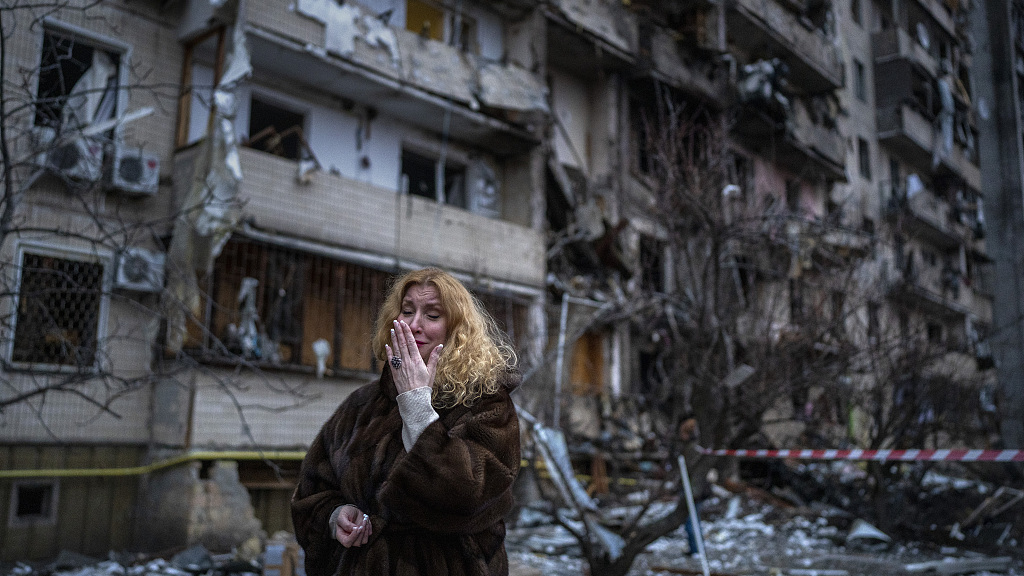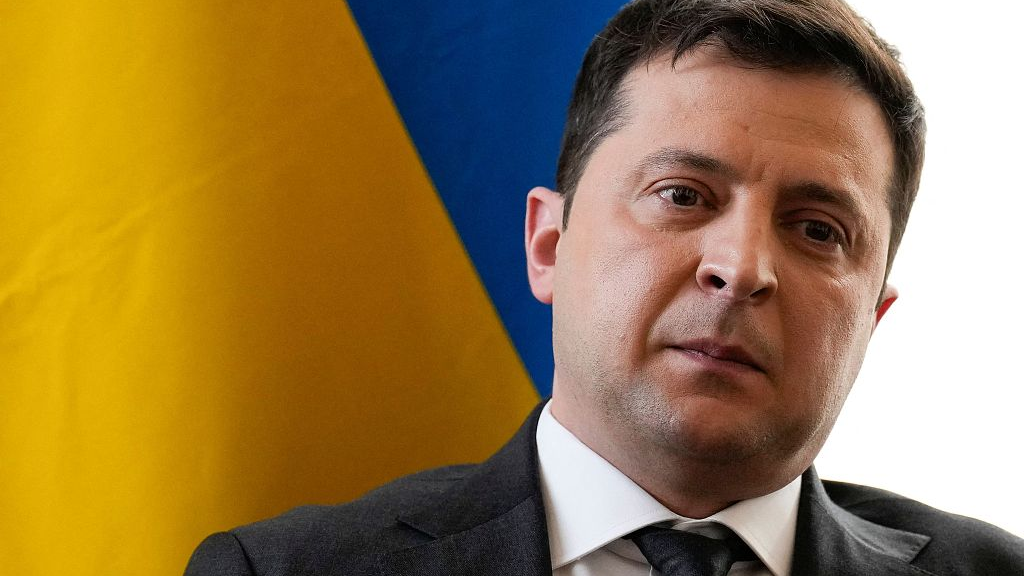
A woman reacts next to her house following a rocket attack in the city of Kyiv, Ukraine, February 25, 2022. /VCG
A woman reacts next to her house following a rocket attack in the city of Kyiv, Ukraine, February 25, 2022. /VCG
Editor's note: Stephen Ndegwa is a Nairobi-based communication expert, lecturer-scholar at the United States International University-Africa, author and international affairs columnist. The article reflects the author's opinions and not necessarily the views of CGTN.
It seems Ukraine and its Western allies led by the United States underestimated the resolve of President Vladimir Putin to guard Russia's territorial integrity and correct what he sees as a fundamental historical breach of its borders. Justifiably, Putin is also concerned about the use of Ukraine as a front in the cheeky eastward encroachment toward Russia by the National Atlantic Treaty Organization (NATO).
Ukrainian President Volodymyr Zelenskyy is fast realizing that he was all along duped by his Western friends and used as a pawn in a determined geopolitical war against Moscow. Western media's propaganda trying to incite Zelenskyy by praising his defiance against Russian forces has actually worsened the increasingly fluid situation in Ukraine.
Tellingly, over the weekend, Zelenskyy called out his supposed Western allies for abandoning him at his gravest hour, saying his country has been "left alone" to face the Russian special military operation. He has realized that Western sanctions against Russia are overrated for such a solid economy, with the West eschewing any direct military intervention so far.
Analysts fear that as a former comedian who acted president on TV entertainment programs, Zelenskyy has taken the joke too far. Reality has dawned on him that things are not what they always look like. He would be wiser to ignore the West's incitement to escalate the war, call for a truce and earnestly seek for a negotiation out of Ukraine's imminent takeover.

Ukrainian President Volodymyr Zelenskyy attends a meeting during the Munich Security Conference in Munich, Germany, February 19, 2022. /VCG
Ukrainian President Volodymyr Zelenskyy attends a meeting during the Munich Security Conference in Munich, Germany, February 19, 2022. /VCG
Though still pretending, the West is becoming increasingly weary of the Ukrainian crisis due to a combination of factors. First, it knows the historical truth about Putin's grievances, having played a role in the demarcation of the two countries. The chickens have truly come home to roost for the U.S. and its European allies.
Secondly, the COVID-19 pandemic that started in 2020 and the consequent global recession has hit Western economies hard. The massive resources needed for a full-scale military intervention would not be commensurate to the returns for protecting Ukraine, particularly at a time when massive resources are desperately needed to revamp the currently delicate economies. It would create political upheaval, with citizens questioning spending on such an unproductive external priority when they are being rendered jobless and homeless.
The guilt of past interventions is also haunting the West. The U.S., specifically, has a lot of innocent blood on its hands for the decades of so-called military interventions that have yielded naught when juxtaposed with official pronouncements that served as excuses for forceful entry of other people's lands. The gross interference has left utter wastelands from Africa to Asia and the Middle East, leaving weak, hapless countries with a heavy human and financial toll. Afghanistan serves as the latest example of this fact.
Even as the West's media goes overdrive with pro-Ukraine and anti-Russia propaganda, the truth is out there. In an opinion on BBC titled, "Ukraine conflict: Why Biden won't send troops to Ukraine," Barbara Plett Usher rightly observes that while "President Joe Biden has spent enormous diplomatic capital on countering Russian aggression toward Ukraine," he has drawn a "red line in the most consequential foreign policy crisis of his presidency."
Among other reasons for Biden's apparent betrayal, Plett Usher argues that the U.S. has no national interests in Ukraine, military interventionism is not part of his modus operandi, the American public does not support a war either, and the president does not want to spark a "world war" in a confrontation between the two superpowers. That leaves Ukraine lonely and exposed.
But even at this darkest hour, there is still room for diplomacy as talks begin in Belarus between the two combatants. Chinese State Councilor and Foreign Minister Wang Yi on Saturday reiterated his appeal for a return to the negotiating table by the major players — NATO, the European Union, Ukraine and Russia. More diplomatic pressure on Sunday by Israeli's Prime Minister Naftali Bennett's offer to mediate an end to the crisis also seems to have moved the antagonists. Observers see Bennett's motivation arising from Putin's assertion that Ukraine is led by "a gang of drug addicts and neo-Nazis."
Meanwhile, Zelenskyy should avoid taking his citizens to slaughter in the name of patriotism. He had better admit that he's been played by the West, and approach Putin like a younger brother for rapprochement. His predicament is captured appropriately by an African proverb that says "a distant rod cannot kill a snake." His naivety that the West would sacrifice its troops for him, or that Western sanctions are an effective deterrence, has cost his country dearly.
Ukraine needs to trace its steps back to the post-Soviet Union 1990s when its foreign policy blueprint was characterized by a balanced cooperation with the EU, Russia and other powerful entities. It should maintain its independence and avoid being misused by any power.
(If you want to contribute and have specific expertise, please contact us at opinions@cgtn.com.)

